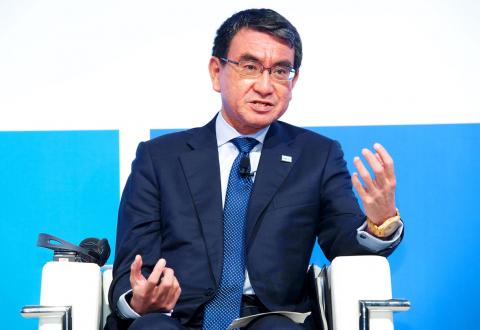The government yesterday said it would continue to seek Tokyo’s support and understanding after a top Japanese official said that Taiwan is unlikely to join the Comprehensive and Progressive Agreement for Trans-Pacific Partnership (CPTPP) because of the result of its referendum banning certain Japanese food imports.
“Japan’s reaction is understandable and this is going to be a strenuous challenge for Taiwan,” Executive Yuan spokeswoman Kolas Yotaka said, adding that the Cabinet has instructed government agencies to communicate with Tokyo.
The Ministry of Foreign Affairs in a press release said it would continue to engage in “earnest communication” with Japan and handle with discretion any possible actions Tokyo could take in response to the passage of a referendum on Nov. 24 that called for a continued ban on imports of Japanese agricultural and food products from Fukushima and four other prefectures after the 2011 Fukushima Dai-ichi nuclear power plant disaster.

Photo: EPA-EFE
A total of 7,791,856 people, or 78 percent of the votes cast, favored retaining the ban, further tying the hands of the Democratic Progressive Party (DPP) administration, which has sought to relax the major impediment to bilateral trade relations.
Speaking to reporters in Tokyo yesterday, Japanese Minister of Foreign Affairs Taro Kono reiterated Tokyo’s regret over the referendum’s passage, which he said has unfortunately made Taiwan’s bid to join the Japan-led CPTPP unlikely.
“If this [Taiwan’s import ban] violates WTO regulations, Japan does not rule out taking the matter to the WTO. In addition, the CPTPP pact is expected to take effect this year and it is very regrettable that this matter has made it unlikely for Taiwan to join the partnership,” Kono said.
It was the first time Kono has directly connected the import ban on Japanese food products with Taiwan’s chances of joining the CPTPP.
The ban has also resulted in the suspension of the Taiwan-Japan Economic Partnership Committee, which was established in 2013 as a platform for discussing economic, trade and investment issues.
After the conclusion of the annual Taiwan-Japan trade and economic meeting in Taipei on Nov. 30, Taiwan-Japan Relations Association Secretary-General Chang Shu-ling (張淑玲) conveyed Taiwan’s hope of being included in the CPTPP to her Japanese counterparts through different channels.
“We hope that Japan could offer us more assistance, including through the exchange of information,” she said.
Chinese Nationalist Party (KMT) Vice Chairman Hau Lung-bin (郝龍斌), who initiated the referendum, in a press release said that Japan’s use of the ban as a threat showed that the DPP’s claim that Taiwan-Japan relations are “at their best” is a lie.
“Taiwan and Japan have always had an uneven trade relationship. Taiwan holds a trade deficit of NT$600 billion [US$19.45 billion] with Japan. Haven’t we bought enough?” Hau asked, adding that the Taiwan-Japan relationship should not be built solely on meeting Japan’s demands.
According to Ministry of Finance statistics, Taiwan had a trade deficit of NT$634.8 billion with Japan last year.
Additional reporting by Lee Hsin-fan and CNA

Tropical Storm Gaemi strengthened into a typhoon at 2pm yesterday, and could make landfall in Yilan County tomorrow, the Central Weather Administration (CWA) said yesterday. The agency was scheduled to issue a sea warning at 11:30pm yesterday, and could issue a land warning later today. Gaemi was moving north-northwest at 4kph, carrying maximum sustained winds near its center of up to 118.8kph and gusts of 154.8kph. The circumference is forecast to reach eastern Taiwan tomorrow morning, with the center making landfall in Yilan County later that night before departing from the north coast, CWA weather forecaster Kuan Shin-ping (官欣平) said yesterday. Uncertainty remains and

SEA WARNING LIKELY: The storm, named Gaemi, could become a moderate typhoon on Wednesday or Thursday, with the Taipei City Government preparing for flooding A tropical depression east of the Philippines developed into a tropical storm named Gaemi at 2pm yesterday, and was moving toward eastern Taiwan, the Central Weather Administration (CWA) said. Gaemi could begin to affect Taiwan proper on Tuesday, lasting until Friday, and could develop into a moderate typhoon on Wednesday or Thursday, it said. A sea warning for Gaemi could be issued as early as Tuesday morning, it added. Gaemi, the third tropical storm in the Pacific Ocean this typhoon season, is projected to begin moving northwest today, and be closest to Taiwan on Wednesday or Thursday, the agency said. Today, there would likely

DISRUPTIONS: The high-speed rail is to operate as normal, while several airlines either canceled flights or announced early departures or late arrivals Schools and offices in 15 cities and counties are to be closed today due to Typhoon Gaemi, local governments announced last night. The 15 are: Taipei, New Taipei City, Taoyuan, Tainan, Keelung, Hsinchu and Kaohsiung, as well as Yilan, Hualien, Hsinchu, Miaoli, Chiayi, Pingtung, Penghu and Lienchiang counties. People should brace for torrential rainfall brought by the storm, with its center forecast to make landfall on the east coast between tonight and tomorrow morning, the Central Weather Administration (CWA) said. The agency issued a sea warning for the typhoon at 11:30pm on Monday, followed by a land warning at 11:30am yesterday. As of

CASUALTY: A 70-year-old woman was killed by a falling tree in Kaohsiung as the premier warned all government agencies to remain on high alert for the next 24 hours Schools and offices nationwide are to be closed for a second day today as Typhoon Gaemi crosses over the nation, bringing torrential rain and whipping winds. Gaemi was forecast to make landfall late last night. From Tuesday night, its outer band brought substantial rainfall and strong winds to the nation. As of 6:15pm last night, the typhoon’s center was 20km southeast of Hualien County, Central Weather Administration (CWA) data showed. It was moving at 19kph and had a radius of 250km. As of 3pm yesterday, one woman had died, while 58 people were injured, the Central Emergency Operation Center said. The 70-year-old